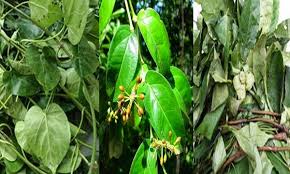Ukazi leaf, also known as Gnetum africanum, is a popular leafy vegetable in West Africa, particularly in Nigeria and Cameroon.
This dark green leaf, commonly used in soups and stews, has been celebrated for its numerous health benefits and nutritional value.
Ukazi is widely recognized not only for its role in enhancing the flavor of dishes but also for its medicinal and therapeutic properties.
One of the primary benefits of Ukazi leaf is its rich fiber content. Dietary fiber plays a significant role in improving digestion and promoting bowel regularity.
By aiding in the efficient movement of food through the digestive system, Ukazi helps prevent constipation and other digestive disorders.
Fiber also supports weight management by promoting a feeling of fullness, reducing the likelihood of overeating. Ukazi leaf is also known for its high levels of essential vitamins and minerals.
It contains vitamins A and C, which are powerful antioxidants that help boost the immune system and protect the body from harmful free radicals.
Vitamin A supports good vision and skin health, while vitamin C promotes collagen production and aids in tissue repair.
In addition, Ukazi contains potassium and calcium, which are vital for maintaining healthy blood pressure levels and strong bones.
Furthermore, Ukazi leaf is beneficial for heart health. The presence of potassium helps regulate blood pressure by balancing sodium levels in the body.
A diet rich in potassium is linked to a lower risk of hypertension and heart-related diseases. Ukazi’s fiber content also contributes to lowering cholesterol levels, reducing the risk of heart disease. Ukazi leaf has anti-inflammatory properties that may help in managing chronic inflammation in the body.
Chronic inflammation is associated with several diseases, including arthritis, diabetes, and heart disease. Regular consumption of Ukazi may aid in reducing inflammation and promoting overall well-being. In traditional African medicine, Ukazi has been used for its medicinal properties to treat a variety of ailments.
It is believed to have healing effects for conditions like stomach upset, sore throat, and even fatigue. Additionally, its high antioxidant content helps in detoxifying the body, promoting a healthy liver, and aiding in the removal of harmful toxins from the system.
Another notable benefit of Ukazi is its role in boosting energy levels. Due to its high protein content, Ukazi provides a good source of plant-based protein, which is essential for energy production, muscle repair, and overall vitality. This makes it particularly beneficial for individuals following vegetarian or plant-based diets.
Nutritional Composition of Ukazi Leaf

Ukazi leaf, also known as Gnetum africanum, is packed with essential nutrients that contribute to its health benefits.
Here are some of the key nutrients found in Ukazi leaf:
1. Vitamins: Ukazi leaf is rich in vitamins, particularly vitamin A and vitamin C. Vitamin A supports eye health, while vitamin C boosts immunity and promotes skin health.
2. Minerals: Ukazi provides essential minerals such as calcium, magnesium, iron, and potassium. These minerals support bone health, muscle function, and overall body metabolism.
3. Dietary Fiber: Ukazi is a good source of dietary fiber, which plays a key role in maintaining digestive health and regulating blood sugar levels.
4. Protein: The leaf contains a moderate amount of plant-based protein, which is important for tissue repair and overall growth, making it a valuable addition to plant-based diets.
5. Antioxidants: Ukazi is also loaded with antioxidants, which help protect the body from oxidative stress and inflammation.
Health Benefits of Ukazi Leaf
Ukazi leaf offers several health benefits due to its rich nutritional composition.
Some of these include:
1. Boosts Immune System: The high content of vitamin C in Ukazi helps strengthen the immune system, protecting the body against common illnesses and infections.
2. Promotes Eye Health: Vitamin A in Ukazi plays a vital role in maintaining good vision and preventing eye-related diseases like night blindness.
3. Supports Bone Health: The calcium and magnesium found in Ukazi contribute to strong bones and teeth, reducing the risk of osteoporosis.
4. Aids in Weight Management: With its high fiber content, Ukazi helps promote a feeling of fullness, making it useful for people looking to manage their weight.
5. Regulates Blood Pressure: The potassium in Ukazi helps balance sodium levels in the body, which can assist in controlling high blood pressure and supporting heart health.
6. Fights Inflammation: Antioxidants in Ukazi reduce inflammation, helping to manage conditions like arthritis and other inflammatory diseases.
Ukazi Leaf for Digestive Health
Ukazi leaf is particularly beneficial for maintaining a healthy digestive system.
Here’s how it helps:
1. Improves Bowel Movement: The dietary fiber in Ukazi aids in digestion by promoting regular bowel movements and preventing constipation.
2. Prevents Digestive Disorders: Fiber also helps reduce the risk of digestive issues such as bloating, indigestion, and irritable bowel syndrome (IBS).
3. Supports Gut Health: By promoting the growth of healthy gut bacteria, Ukazi contributes to a balanced gut microbiome, which is essential for overall digestive health.
4. Detoxification: The fiber in Ukazi helps in the elimination of toxins from the digestive tract, promoting overall detoxification of the body.
Read Also: 17 Medicinal Health Benefits Of Lotus Seed (Nelumbo nucifera)
Anti-inflammatory Effects of Ukazi Leaf
Ukazi leaf, known for its rich nutritional profile, also possesses strong anti-inflammatory properties that can benefit overall health.
These effects are attributed to the antioxidants and bioactive compounds found in the leaf.
1. Reduces Inflammation: The antioxidants, particularly flavonoids and polyphenols, in Ukazi leaf help neutralize free radicals, which are harmful molecules that contribute to inflammation in the body. Regular consumption of Ukazi can help in managing chronic inflammation and reducing the risk of diseases such as arthritis, heart disease, and diabetes.
2. Alleviates Pain: The anti-inflammatory properties of Ukazi leaf can help alleviate pain associated with inflammatory conditions, such as joint pain or muscle soreness. This makes it a useful natural remedy for people suffering from inflammatory disorders.
3. Promotes Healing: By reducing inflammation, Ukazi supports the body’s natural healing processes. This can accelerate recovery from injuries and promote tissue repair, making it a beneficial addition to a diet aimed at improving recovery times.
Ukazi Leaf in Traditional Medicine
Ukazi leaf has been used for centuries in traditional African medicine due to its numerous health benefits.
Here are some traditional uses:
1. Treating Digestive Issues: Ukazi is commonly used in traditional remedies to treat indigestion, stomach pain, and constipation. Its fiber content aids in digestive health, while its soothing properties help relieve discomfort.
2. Managing Inflammation: Traditionally, Ukazi is used to manage inflammatory conditions, such as arthritis and other joint-related issues. It is often consumed in soups or made into herbal concoctions to reduce swelling and pain.
3. Boosting Immunity: In traditional medicine, Ukazi is valued for its ability to strengthen the immune system. It is used as a remedy to prevent infections and illnesses, particularly during flu seasons or when recovering from sickness.
4. Improving Fertility: In some African communities, Ukazi leaf is believed to enhance fertility in women. It is included in fertility-enhancing diets, though more scientific evidence is needed to support this traditional use.
5. Blood Sugar Regulation: Ukazi is also used in traditional medicine to manage blood sugar levels in people with diabetes, helping regulate glucose metabolism.
How to Incorporate Ukazi Leaf into Your Diet

Ukazi leaf can be easily incorporated into a variety of dishes, providing a healthy addition to your meals.
Here are some simple ways to use Ukazi leaf in your diet:
1. Soups and Stews: One of the most popular ways to use Ukazi is in traditional African soups, like afang soup or edikang ikong. The leaf is typically shredded and added to these rich stews, enhancing the flavor while delivering its nutritional benefits.
2. Salads: Fresh Ukazi leaves can be chopped and added to salads. Their slightly bitter taste adds a unique flavor to raw vegetable mixes, making them a great base for nutritious, green salads.
3. Smoothies: For a nutrient-packed boost, Ukazi leaves can be blended into smoothies. This allows you to enjoy the health benefits of Ukazi in a convenient and refreshing drink. Pair it with fruits like bananas or apples to balance its natural bitterness.
4. Stir-fry: You can add Ukazi to stir-fried vegetables or as a side dish. Lightly cooking the leaves helps to soften them, making them a tasty and healthy addition to your stir-fry meals.
5. Herbal Tea: Dried Ukazi leaves can be used to make herbal tea. Simply steep the leaves in hot water for a few minutes to enjoy a calming, health-promoting tea rich in antioxidants and nutrients.
Read Also: Scrapie in Sheep and Goats: Description, Damages Caused, Control and Preventive Measures
Potential Side Effects of Ukazi Leaf
While Ukazi leaf is generally considered safe and nutritious, there are a few potential side effects to be aware of, especially when consumed in large quantities.
1. Allergic Reactions: Some individuals may be allergic to Ukazi, resulting in symptoms such as itching, swelling, or digestive discomfort. If you notice any adverse reactions after consuming Ukazi, it’s best to stop using it and consult a doctor.
2. Excessive Fiber Intake: Ukazi is rich in dietary fiber, which is beneficial for digestion. However, consuming too much fiber in a short time can lead to bloating, gas, or discomfort. It’s advisable to consume Ukazi in moderate amounts, especially for those not used to high-fiber foods.
3. Interaction with Medications: Since Ukazi may have blood sugar-lowering effects, individuals taking medication for diabetes should monitor their blood sugar levels closely when incorporating Ukazi into their diet. Always consult a healthcare provider before combining it with any medication.
Ukazi Leaf and Cancer Prevention
Ukazi leaf has shown promise in cancer prevention due to its rich antioxidant content.
1. Rich in Antioxidants: Ukazi is loaded with powerful antioxidants like flavonoids and polyphenols, which help neutralize free radicals that damage cells and potentially lead to cancer. By reducing oxidative stress, Ukazi supports the body’s defense against cancer development.
2. Anti-Inflammatory Effects: Chronic inflammation is linked to cancer risk, and Ukazi’s anti-inflammatory properties can help lower this risk. By reducing inflammation, Ukazi may help protect against the development of cancerous cells.
3. Prevention of DNA Damage: Antioxidants in Ukazi may also help prevent DNA mutations caused by free radicals, a critical factor in the prevention of cancer. Regular consumption of antioxidant-rich foods like Ukazi can support long-term health.
Ukazi Leaf for Eye Health

Ukazi leaf contains nutrients that are beneficial for maintaining healthy eyesight and supporting overall eye health.
1. Rich in Vitamin A: Ukazi is a good source of vitamin A, which is essential for eye health. Vitamin A helps maintain the cornea, the surface of the eye, and is vital for good vision, especially in low-light conditions.
2. Prevention of Age-Related Eye Issues: Antioxidants like beta-carotene present in Ukazi help reduce the risk of age-related macular degeneration (AMD), which can lead to blindness in older adults.
3. Protection Against Cataracts: The anti-inflammatory properties of Ukazi may also protect the eyes from oxidative stress, reducing the risk of cataracts, a common eye condition associated with aging.
Ukazi Leaf and Detoxification
Ukazi leaf is believed to aid in the detoxification process, helping the body eliminate harmful toxins and improve overall health.
1. Rich in Fiber: The high fiber content in Ukazi aids digestion and promotes the removal of waste from the body. This helps cleanse the digestive system, supporting natural detoxification.
2. Supports Liver Health: Antioxidants in Ukazi support liver function, which plays a critical role in detoxifying the body. By protecting the liver from oxidative damage, Ukazi helps maintain the body’s natural detox pathways.
3. Flushes Out Toxins: Regular consumption of Ukazi may support the kidneys and the excretory system, promoting the efficient removal of toxins from the body, contributing to improved overall health.
Scientific Evidence and Case Studies on Ukazi Leaf (Gnetum africanum)

1. Antioxidant Activity: Studies show Ukazi leaf contains high levels of flavonoids and polyphenols that neutralize free radicals and reduce oxidative stress.
2. Anti-inflammatory Properties: Research indicates bioactive compounds in Ukazi help lower inflammatory markers, supporting management of chronic conditions.
3. Digestive Health Support: Evidence highlights the high dietary fiber content aiding bowel regularity and gut microbiome balance.
4. Nutrient-Rich Profile: Analyses confirm significant amounts of vitamins A and C, plus minerals like calcium and potassium, contributing to immune and bone health.
5. Traditional Use Validation: Investigations link traditional applications for blood sugar regulation and detoxification to observed phytochemical effects.
Summary of Ukazi Leaf Benefits
| Aspect | Key Details |
|---|---|
| Introduction | Ukazi leaf (Gnetum africanum) is a nutrient-dense West African vegetable used in soups/stews with medicinal properties. |
| Nutritional Composition | Rich in vitamins A & C, minerals (calcium, potassium, iron), dietary fiber, plant-based protein, and antioxidants. |
| General Health Benefits | Boosts immunity, eye health, bone strength, weight management, blood pressure regulation, and fights inflammation. |
| Digestive Health | Improves bowel movements, prevents disorders, supports gut bacteria, and aids detoxification. |
| Anti-inflammatory Effects | Reduces chronic inflammation, alleviates pain, and promotes healing via antioxidants. |
| Traditional Medicine | Used for digestive issues, inflammation, immunity, fertility, and blood sugar control. |
| Incorporation Methods | Soups/stews, salads, smoothies, stir-fries, herbal tea. |
| Side Effects | Possible allergies, excessive fiber issues, medication interactions (e.g., diabetes drugs). |
| Specialized Benefits | Cancer prevention potential, eye health support, detoxification aid. |
Frequently Asked Questions
1. What is Ukazi leaf?
Ukazi leaf, scientifically known as Gnetum africanum, is a dark green leafy vegetable popular in West African cuisine, especially in Nigeria and Cameroon, valued for both flavor and health benefits.
2. What are the main nutrients in Ukazi leaf?
Ukazi is rich in vitamins A and C, minerals like calcium, potassium, magnesium, and iron, dietary fiber, plant-based protein, and powerful antioxidants.
3. How does Ukazi leaf benefit digestion?
Its high fiber content promotes regular bowel movements, prevents constipation, reduces bloating, supports gut bacteria balance, and aids in toxin elimination.
4. Can Ukazi leaf help with blood pressure?
Yes, the potassium in Ukazi helps balance sodium levels, regulate blood pressure, and support heart health when included in a balanced diet.
5. Is Ukazi leaf good for weight management?
Yes, its fiber promotes fullness, reduces overeating, and supports healthy weight control as part of a calorie-conscious diet.
6. Does Ukazi have anti-inflammatory effects?
Yes, antioxidants like flavonoids and polyphenols help reduce chronic inflammation linked to conditions such as arthritis and heart disease.
7. How is Ukazi used in traditional medicine?
Traditionally, it’s used to treat digestive issues, inflammation, boost immunity, support fertility, and help regulate blood sugar levels.
8. Are there any side effects of consuming Ukazi leaf?
Generally safe, but possible issues include allergies, bloating from excess fiber, or interactions with diabetes medications—consume moderately and consult a doctor if needed.
9. Can Ukazi leaf be eaten raw?
Yes, fresh leaves can be added to salads or smoothies, though it’s most commonly cooked in soups and stews to soften its slightly bitter taste.
10. How can I incorporate Ukazi into my daily diet?
Add it to soups like afang, salads, smoothies, stir-fries, or brew as herbal tea for easy nutritional boosts.
Do you have any questions, suggestions, or contributions? If so, please feel free to use the comment box below to share your thoughts. We also encourage you to kindly share this information with others who might benefit from it. Since we can’t reach everyone at once, we truly appreciate your help in spreading the word. Thank you very much for your support and for sharing!
Disclaimer: This article is for educational and informational purposes only. The health benefits described are based on scientific research and traditional knowledge. They ayre not a substitute for professional medical advice, diagnosis, or treatment. Always consult a healthcare professional before using any herb or natural remedy for medical purposes.

